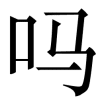Difference between revisions of "Language/Mandarin-chinese/Vocabulary/吗-ma"
< Language | Mandarin-chinese | Vocabulary
Jump to navigation
Jump to search
Tags: Mobile edit Mobile web edit Visual edit |
(→Uses) Tags: Mobile edit Mobile web edit |
||
| Line 3: | Line 3: | ||
'''吗 (ma), the interrogative final particle.''' | '''吗 (ma), the interrogative final particle.''' | ||
==Uses== | ==Uses== | ||
吗 (ma) is one of the most common particles in Chinese. A particle | 吗 (ma) is one of the most common particles in Chinese. A particle goes on the end of a sentense. | ||
It is used to ask questions. | It is used to ask questions. | ||
The particle '''吗''' is placed on the end of question which can only be answered with a “yes” or a “no”. | The particle '''吗''' is placed on the end of question which can only be answered with a “yes” or a “no”. | ||
==Examples== | ==Examples== | ||
Revision as of 13:32, 24 December 2016
吗 (ma), the interrogative final particle.
Uses
吗 (ma) is one of the most common particles in Chinese. A particle goes on the end of a sentense.
It is used to ask questions.
The particle 吗 is placed on the end of question which can only be answered with a “yes” or a “no”.
Examples
- 你饿吗 Nǐ è ma?
Are you hungry?
- 你要去上海吗 Nǐ yào qù Shànghǎi ma?
Are you going to go to Shanghai?
- 你是中国人吗 Nǐ shì zhōngguórén ma?
Are you Chinese?
Other particles
How to make the difference between 吧 (ba) and 吗 (ma)?: The particle 吧 (ba)
